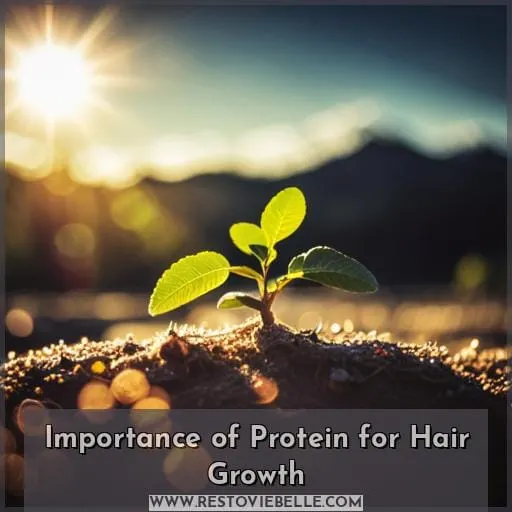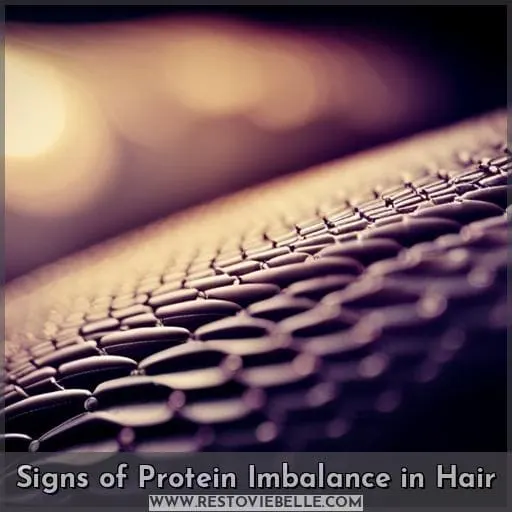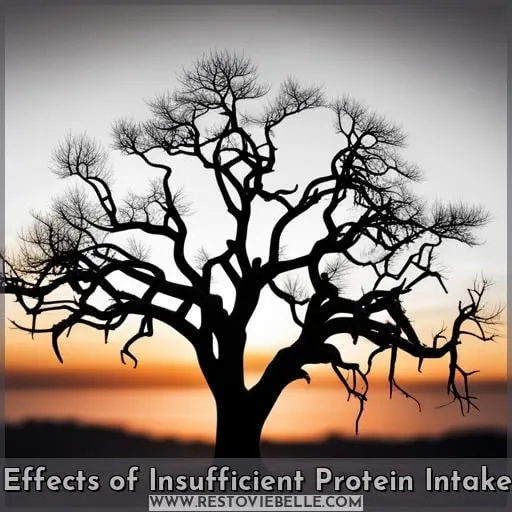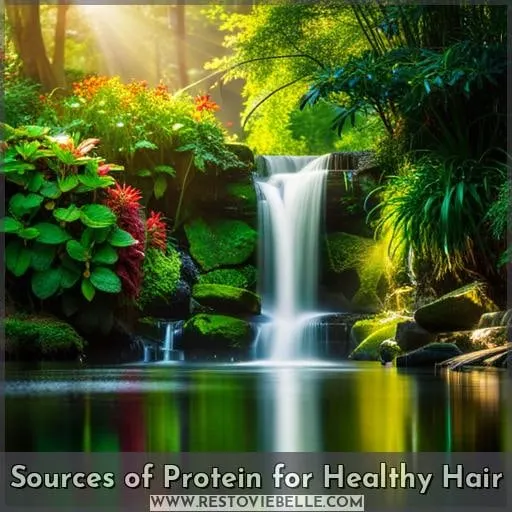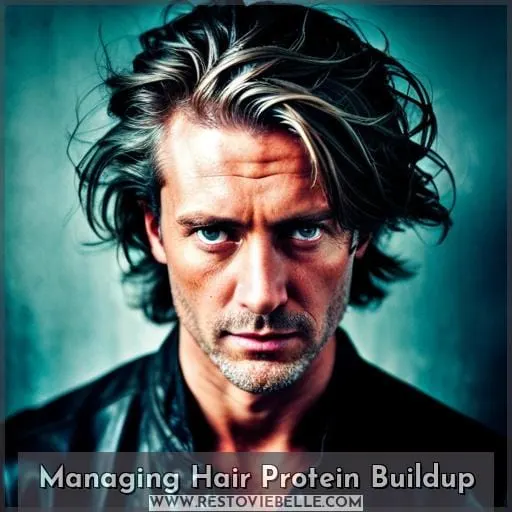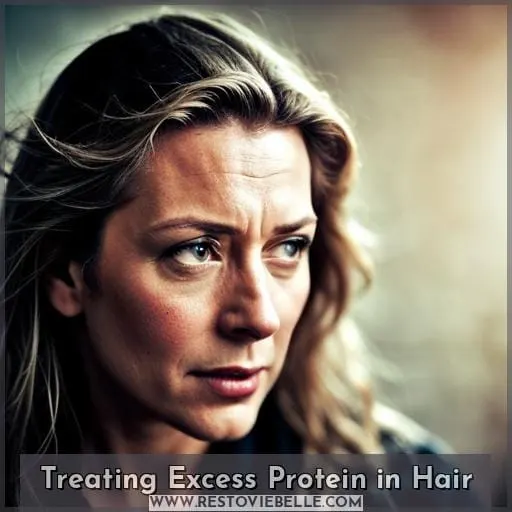This site is supported by our readers. We may earn a commission, at no cost to you, if you purchase through links.
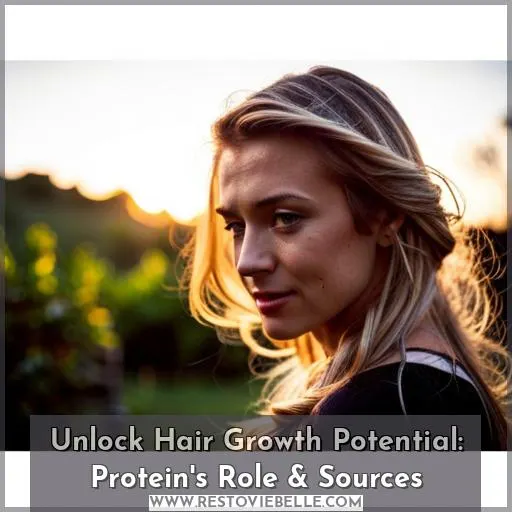 Are you looking for a way to boost your hair growth? If so, you may be wondering how much protein do I need for hair growth. Protein plays an essential role in both the structure and health of your locks, as it provides building blocks for new strands.
Are you looking for a way to boost your hair growth? If so, you may be wondering how much protein do I need for hair growth. Protein plays an essential role in both the structure and health of your locks, as it provides building blocks for new strands.
It’s important to get enough of this nutrient from food sources or supplements if you want thicker tresses that are less prone to breakage and damage.
In this article, we will explore the effects of insufficient protein intake on hair health, tips on managing protein buildup in your strands, plus some great sources of dietary proteins that can help promote stronger follicles and faster-growing manes! Read on to learn more about how proteins can help give you healthier locks!
Table Of Contents
Key Takeaways
- Protein is crucial for hair growth and health.
- Insufficient protein can lead to weakened and dry hair.
- It is important to maintain a balance between protein and moisture for healthy hair.
- Sources of dietary protein include eggs, dairy, nuts, seeds, lean meats, fish, and beans.
Importance of Protein for Hair Growth
You can revitalize your hair, invigorate your skin, and fortify your nails with our scientifically-backed blend of essential vitamins, minerals, and amino acids. Protein plays a vital role in promoting healthy hair growth as it helps to rebuild the structure of damaged strands while also strengthening follicles from within.
A balanced diet rich in protein is key for proper nutrition and keeping locks looking their best. Foods such as eggs, dairy products, nuts, and seeds are high sources that should be included regularly into one’s daily routine for optimal results.
Protein helps form keratin, which is an important component when rebuilding the structure of damaged tresses or helping to keep existing ones strong and supple over time. This makes it even more imperative to maintain a good balance between proteins consumed through dietary means versus externally applied treatments like deep conditioning masks or shampoos containing hydrolyzed protein ingredients.
Too much external application can lead to scalp buildup, whereas too little intake may lead to nutrient deficiencies causing brittle strands prone to breakage.
Signs of Protein Imbalance in Hair
If you’re experiencing hair thinning, breakage, or split ends, it could be a sign of an imbalance in your protein levels – don’t let these signs slip away unnoticed! Changes to the texture and elasticity of your hair are one indicator that something isn’t quite right.
If the texture has changed from being strong and shiny to brittle and dull, this could indicate a lack of protein.
On the other hand, if you have been overindulging in proteins, then there may be too much keratin present, which can lead to scalp irritation resulting in slow growth or even complete baldness depending on severity.
The best way to maintain healthy hair is by monitoring how much protein you consume daily, along with taking supplements when needed – but keep in mind not all forms are created equal, so always do research before consuming any product!
Consuming enough essential vitamins such as Vitamin A & C will help support overall health, while zinc helps promote faster cell division, aiding new growth quicker than usual – look out for these ingredients within supplement labels if possible!
Lastly, make sure adequate amounts of water are consumed throughout the day – hydration keeps strands nourished, helping prevent further damage caused by improper nutrition balance between proteins, vitamins, minerals, etc.
Effects of Insufficient Protein Intake
Without sufficient protein intake, you may experience weakened hair strands and reduced growth. Protein is essential for the formation of keratin, which forms the basis of healthy hair. A lack of dietary protein can lead to weak, brittle, and dry locks due to a decrease in collagen production.
This causes your cuticles (outer layer) to become rough, leading to split ends or breakage. These issues can make it difficult for your mane to regain its natural strength and shine.
Protein deficiency effects also manifest as overall thinning throughout the scalp, making it more prone to shedding. It can also result in bald patches where no new hairs are able to grow back in their place.
Adequate amounts of proteins are necessary for nourishment from within so that our follicles receive all they need without any external intervention, such as styling products or chemical treatments. These external factors can strip away essential nutrients over time, leaving the hair vulnerable to further damage caused by heat appliances or harsh weather conditions like sun exposure with high temperatures and humidity levels, both indoors and outdoors, respectively.
Sources of protein include lean meats, fish, eggs, as well as plant-based options like nuts and beans, depending on individual dietary preferences. Regardless of the source, these protein-rich foods should be consumed regularly.
However, excessive amounts should be avoided, as too much buildup could clog pores, resulting in various skin problems, including acne flare-ups near the temples where facial follicles exist, as well as at the crown region, commonly known as bald spots.
Sources of Protein for Healthy Hair
Replenish your beauty regimen with a protein-rich solution to promote healthy hair growth. Protein is essential for building strong and healthy hair, as it forms the basis of all tissues in the body, including those that make up our locks.
To reap maximum benefits from this vital nutrient, consider plant-based options such as legumes, nuts, and seeds – all excellent sources of protein-rich foods. Additionally, incorporating more fish into your diet can be beneficial for both overall health and improving the hair health connection due to their high levels of omega-3 fatty acids, which are known to stimulate natural hair growth.
The amount needed will vary depending on individual needs, but generally speaking, following a balanced diet full of varied proteins is recommended when looking to maintain or improve existing trusses (hair follicles).
Additionally, supplementing with fortified products containing biotin may also assist in sustaining healthier strands, while eating plenty of leafy green vegetables like kale should not be overlooked either since they contain key nutrients such as iron, which helps build new hair proteins faster than usual, resulting in extra volume over time.
So keep an eye out for these powerhouses next time you’re grocery shopping!
Managing Hair Protein Buildup
To keep hair looking healthy and shiny, it’s important to manage protein buildup. Achieving a balance of protein and moisture is essential for optimal hair health. Washing techniques play a significant role in preventing excess proteins from accumulating on the scalp or in strands of hair.
Hair care products that are overly rich in proteins can lead to signs of overload, such as dryness, brittleness, breakage, or dullness. To address buildup issues caused by too much protein, it’s recommended to use gentle washing methods with lukewarm water.
Additionally, incorporating a clarifying shampoo at least once a week can help remove any residue left over after using high-protein products like shampoos and styling lotions.
When using conditioner, it’s advisable to dilute it with distilled water and apply it only throughout the length of the hair, avoiding the scalp area. This will help prevent further buildup. After washing and conditioning, if needed, consider using a moisturizing conditioner or hydrating serum to provide additional moisture to the hair.
For those days when extra hydration is required, incorporating an occasional deep conditioning treatment can be beneficial. This will help balance out the protein and moisture levels in the hair, promoting overall hair health.
Treating Excess Protein in Hair
If you’re looking to reverse the damage of too much protein in your hair, our hair growth vitamins are here to help! Our scientifically-backed blend provides essential nutrients that nourish and strengthen both your locks and nails.
For an effective solution for excess protein buildup, we recommend avoiding high-protein products altogether or using them sparingly.
If you do decide to use a product with protein ingredients, make sure it is balanced out by moisturizing ingredients as well so that moisture levels remain consistent throughout the strands. You should also aim for regular trims every 6–8 weeks in order to keep split ends at bay while restoring damaged areas simultaneously.
The right combination of these techniques will help restore balance within your locks while providing long-term protection against future buildups – all without sacrificing shine or beauty!
Conclusion
It’s no secret that protein serves as the building block of life and is an essential part of a healthy diet. But did you know that your hair needs protein to stay strong and healthy too? Without the proper amount of protein, hair growth can be stunted, leaving you with dull, brittle, and thinning hair.
Fortunately, there are many sources of protein that can help ensure your hair gets the nourishment it needs. From animal sources like eggs, fish, and meat to plant-based sources like nuts and legumes, there’s an option for everyone.
However, too much protein can also cause buildup in your hair, leading to dryness and breakage.
To combat this, use clarifying shampoos and conditioners to keep the scalp clean and healthy. With the right amount of protein and proper hair care, you can ensure your hair is healthy and strong.
